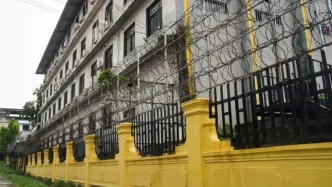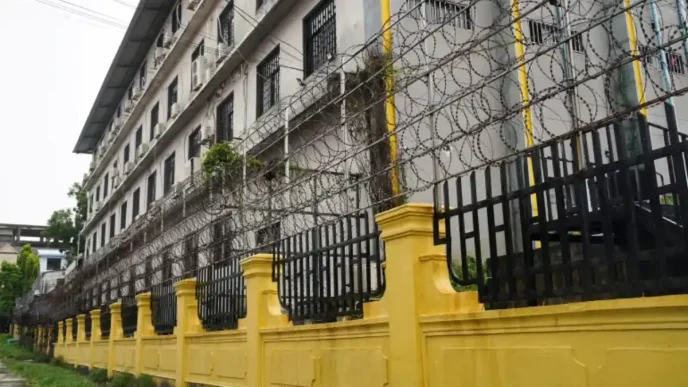A wave of protests has swept through Bangkok as hundreds of demonstrators, led by three prominent activist groups, rallied outside the Finance Ministry on Thursday to demand the cancellation of a controversial bill that would legalise casinos in Thailand. The proposed entertainment complex bill, spearheaded by Deputy Finance Minister Julapun Amornvivat, has ignited fierce opposition from various sectors of society, with critics accusing the government of prioritising economic gain over social welfare. The protests, which have been ongoing since Sunday outside Government House, mark a significant escalation in public dissent against the policy, raising questions about the government’s intentions and the potential societal impact of legalised gambling.
A United Front Against Casino Legalisation
The protesters, organised by the Network of Students and People for Thailand’s Reform, the Dharma Army, and the Centre of People for Monarchy Protection, have been vocal in their opposition to the bill. Their demonstration shifted from Government House to the Finance Ministry on Thursday, where they sought to deliver a formal letter of opposition directly to Julapun. A senior aide, Sikharin Limnijsorakul, accepted the letter on his behalf, but the gesture did little to quell the crowd’s frustration.
A protest leader, speaking on behalf of the groups, explained their focus on the Finance Ministry: “This is the main agency pushing for the bill’s enactment, despite strong opposition from across society.” The statement reflects a broader sentiment among the demonstrators, who believe the government is disregarding public concerns in its pursuit of the legislation. Photos circulating from the rally, originally provided by local media, captured the scale of the demonstration, with banners and placards decrying the bill as a threat to Thai values and social stability.
The groups have vowed to remain camped outside key government buildings until their demands are met, signaling a prolonged standoff. Their primary grievance centres on the belief that the bill, while ostensibly aimed at boosting tourism, may ultimately pave the way for widespread gambling among Thai citizens—a concern that has resonated with conservative and religious communities in particular.
Controversy Over the Bill’s Intent
At the heart of the debate is the government’s stated rationale for the entertainment complex bill. Deputy Finance Minister Julapun has repeatedly framed the legalisation of casinos as a means to attract foreign tourists and stimulate economic growth, positioning Thailand as a competitive destination in the region’s tourism market. However, protesters have seized on a specific detail to challenge this narrative: the removal of a proposed condition by the Council of State that would have required Thai casino patrons to maintain a bank balance of at least 50 million baht (approximately £1.1 million).
Critics argue that scrapping this financial threshold undermines the government’s claim that the policy targets foreign visitors. “If this was truly about tourists, why remove the condition that would deter local gamblers?” one protester questioned during the rally. The decision has fueled speculation that the bill is a thinly veiled attempt to legalise casinos for Thai citizens, potentially exacerbating social issues such as gambling addiction and financial ruin among vulnerable populations. While no official data confirms the scale of such risks, the concern is palpable among the demonstrators and their supporters.
The government, for its part, has yet to issue a detailed response to these accusations. Julapun’s role as the lead drafter of the bill has made him a focal point for criticism, with protesters accusing him of dismissing legitimate concerns raised by advisory bodies like the Council of State. If confirmed, this pattern of disregarding expert input could further erode public trust in the legislative process surrounding the bill.
Broader Demands and Historical Grievances
Beyond the casino bill, the protest groups have used the rallies to voice additional demands, some of which tap into long-standing political grievances. Among their requests is an update from the Finance Ministry on a petition submitted on 27 March 2024, which called for the seizure of assets worth 46 billion baht (approximately £1 billion) from former Prime Minister Thaksin Shinawatra. The groups blame Thaksin, a polarising figure in Thai politics, for policies they claim caused significant economic and social damage during his tenure in the early 2000s.
Thaksin’s legacy remains a contentious issue in Thailand, with his supporters crediting him for populist reforms that uplifted rural communities, while detractors accuse him of corruption and abuse of power. The protesters’ invocation of his name during the casino bill rallies suggests a broader dissatisfaction with the current administration, which some perceive as aligned with Thaksin’s political network. However, no evidence has been presented to directly link the casino legislation to Thaksin or his associates, and such claims remain speculative at this stage.
This blending of contemporary policy disputes with historical grievances underscores the complexity of Thailand’s political landscape, where protests often serve as a platform for addressing both immediate and deep-rooted issues. The mention of Thaksin also risks inflaming tensions, given the deep divisions his name continues to evoke more than a decade after his ouster in a 2006 military coup.
Societal and Economic Implications
The debate over casino legalisation touches on broader questions about Thailand’s economic strategy and social fabric. Proponents of the bill argue that regulated casinos, integrated into entertainment complexes, could generate significant revenue and create jobs, particularly in tourist-heavy regions like Bangkok, Pattaya, and Phuket. They point to successful models in neighbouring countries such as Singapore, where tightly controlled casino operations have bolstered tourism without widespread social fallout. If implemented with strict oversight, supporters contend, the policy could provide a much-needed economic boost as Thailand recovers from the lingering effects of the COVID-19 pandemic.
Opponents, however, warn of the potential downsides, particularly for a society where gambling is culturally frowned upon and largely illegal outside of state-sanctioned lotteries and horse racing. They cite studies from other nations showing spikes in problem gambling, debt, and crime following casino legalisation, though specific projections for Thailand remain unconfirmed. Religious and community leaders have also expressed alarm, arguing that the policy could undermine traditional values and disproportionately harm low-income families who might be drawn to gambling as a quick fix for financial struggles.
The removal of the 50-million-baht condition, if verified, could indeed shift the demographic focus of the casinos, making them accessible to a wider—and potentially more vulnerable—segment of the population. Without robust safeguards, critics fear a surge in social issues that could offset any economic gains. The government has yet to release detailed plans for regulation or mitigation measures, leaving much of the debate mired in uncertainty.
Regional Context and International Perspectives
Thailand’s push to legalise casinos must also be viewed in a regional context, where gambling hubs like Macau and Singapore have set a precedent for balancing economic benefits with social controls. Cambodia, too, has embraced casino development in border areas like Sihanoukville, though with mixed results—economic growth has come alongside reports of crime and exploitation. Thailand’s government may be eyeing a similar path, hoping to capture a share of the lucrative Asian tourism market while avoiding the pitfalls seen elsewhere.
Internationally, the issue has drawn limited attention, with most foreign commentary focusing on Thailand’s broader political stability rather than the specifics of the casino bill. However, if the protests escalate or intersect with other governance issues, they could impact perceptions of Thailand as a safe and stable destination for investment and tourism—key pillars of its economy.
Public Sentiment and the Path Ahead
Public opinion on the casino bill appears deeply divided, with urban and rural communities expressing varying levels of concern. In Bangkok, where the protests have garnered significant visibility, many residents seem sympathetic to the demonstrators’ cause, citing fears of social decay over economic promises. In tourist areas, however, some business owners and workers express cautious optimism about the potential for job creation and increased footfall, provided strict regulations are enforced.
The government now faces a delicate balancing act: pushing forward with a policy it believes will drive growth, while addressing legitimate public concerns and avoiding a broader backlash. Concessions, such as reinstating financial barriers for Thai patrons or enhancing social welfare protections, could help defuse tensions, though no such measures have been proposed as of yet. If the standoff persists, the protests could evolve into a larger movement against the administration, particularly if other grievances—such as the unresolved demands regarding Thaksin’s assets—gain traction.
For now, the demonstrators remain steadfast outside the Finance Ministry, their banners a vivid reminder of the stakes involved. As one protest leader put it, “We are here to protect our country’s future, not to let it be gambled away.” Whether their voices will sway policymakers remains to be seen, but the clash over the entertainment complex bill has already exposed deep fault lines in Thai society—ones that may shape the nation’s political discourse for months to come.














